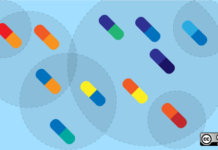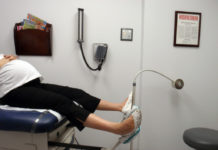Yesterday I Looked Forward to Taking Psych Drugs
People hassle me for being anti-medication, and I always tell them I am NOT anti-medication; I am pro-fully-informed choice. But people like things black-and-white. They see me as being against medications, and so I'm telling you why medications may have saved my life yesterday, or at least saved me a whole bunch more trouble.
SNRIs Added to the List of Drugs with Potential Withdrawal Symptoms
New research suggests that clinicians should exercise caution prescribing SNRIs as first-line treatment for mood and anxiety disorders.
Is There a Small Group for Whom Antidepressants Are Effective?
In a new study, researchers found no evidence of antidepressant group variance, which means that there's no particular group of patients who improve more than others on the drug.
Zoloft Does Not Improve Depression, Even in Severe Cases, Study Finds
Despite their finding, the researchers suggest that SSRIs be given to people who do not meet criteria for depression or anxiety.
Children Taking ADHD Drugs More Likely to Take Antidepressants as Teens
Adhering to a commonly prescribed medication for ADHD in children is associated with higher chances of being prescribed antidepressants in adolescence.
Study Finds ADHD Drugs Alter Developing Brain
A new study, published in the JAMA Psychiatry, investigates the effect of stimulant ‘ADHD’ drugs on the brains of children and young adults. The...
Animal Study Supports Influence of Probiotics on Resilience to Stress
Researchers experimenting on mice found that Lactobacillus—the probiotic commonly found in yogurt—may help reduce depressive symptoms in reaction to chronic stressors. But human studies have found mixed results.
What Happened to those Who Were Suicidal in Study 329? And to the Learned...
In May 2014, the RIAT team asked GSK what the children who became suicidal in the course of Study 329 have since been told. The consent form says that anyone entering the study would be treated just the way they would be in normal clinical practice. In Study 329, the children taking imipramine were by design force titrated upwards to doses of the order of 300 mg, which is close to double the dose of imipramine given in adult trials by GSK or in normal clinical practice. In normal clinical practice it would be usual to inform somebody who had become suicidal on an SSRI that the treatment had caused their problem.
New Study Asks Doctors About Barriers to Deprescribing
Researchers interviewed doctors about the barriers that prevent them from being able to decrease excess medications.
African American and Hispanic Youth Discontinue ADHD Treatment at Higher Rates than White Youth
Study examines racial and ethnic disparities in the quality of care for Medicaid-enrolled children starting ADHD medication.
Biogen Pushes FDA to Approve Failed Alzheimer’s Drug
A new analysis, published in Lancet Neurology, demonstrates how Biogen is spinning results from two failed trials for a new Alzheimer's drug.
“New Pill for Boosting Female Libidos Off to a Slow Start”
Ed Silverman reports that only 80 prescriptions for Addyi, or Flibanserin, were filled in the drugs’ first two weeks on the market.
Article →
Mental Health Nurses Do Not Routinely Assess for Effects of Antipsychotic Medications
Researchers believe that side-effect monitoring is critical because of the increase in the use of antipsychotics
Researchers Ask, ‘Why Do Antidepressants Stop Working?’
An international group of researchers, including several with financial ties to manufacturers of antidepressants, explore possible explanations for why long-term users of antidepressants become chronically depressed.
Chemicals Have Consequences: Antidepressants, Pregnancy, and the New York Times
Depressed pregnant women need good care. They should not be made to feel guilty for the choices they make concerning their depression or lectured to by those who don’t understand the area or lack compassion for them. In that sense, Andrew Solomon does the public a service by turning his attention and writing talents to the topic of depression and pregnancy this week in the New York Times. However, a crucial part of providing good care to depressed pregnant women is to give them accurate information on the topic. In this sense, Andrew Solomon falls short.
Update: Massachusetts Benzodiazepine Bill Hearing
The hearing for Bill H4062: Informed Consent for Benzodiazepines and Non-benzodiazepine Hypnotics took place on Monday – in the middle of an April snowstorm! The discussion clarified some important points in the legislation and gave survivors an opportunity to tell their stories. I was so proud to be there and witness the courage, camaraderie, resilience, advocacy, and vulnerability of fellow survivors. This legislation is our chance to be heard. As one survivor said, through tears, to the committee, “Do not let my suffering be in vain. I beg you to pass this bill.”
Antidepressants During Pregnancy Increase Risk of Psychiatric Diagnosis in Children
New research, based on data from almost a million children in Denmark, suggests that children of mothers who use antidepressants during pregnancy are more likely to be diagnosed with autism and psychiatric disorders.
Confessions of a Trespasser
In a recently published commentary in Psychiatric Times, Ronald Pies and Joseph Pierre made this assertion: Only clinicians, with an expertise in assessing the research literature, should be weighing in on the topic of the efficacy of psychiatric drugs. They wrote their commentary shortly after I had published on madinamerica “The Case Against Antipsychotics,” and it was clear they had me in their crosshairs.
Researchers Find Inadequate Reporting of the Dangers of Ketamine Treatment for Depression
Researchers report that dangerous side effects are not being adequately reported in the trials of ketamine for depression.
SSRI Antidepressants Appear to Raise Risk of Serious Respiratory Disease in Newborns
A new study has reinforced earlier warnings that taking SSRI antidepressants late in pregnancy appears to put mothers at a slightly increased risk of having newborns with persistent pulmonary hypertension.
Quality of Relationship to Doctor Significantly Improves Antidepressant Efficacy
The more that patients feel that they have a high-quality relationship with their prescribing physician, the more likely that they will regard their own responses to antidepressants as positive.
Antipsychotic Dose Reduction Linked To Long-term Improvements In First-Episode Schizophrenia Patients
Careful reductions in dosage levels of antipsychotic medications over time improved long-term rates of recovery and functional remission in patients diagnosed with a first-episode psychosis.
STOP or GO? Tapering Pregnant Women off of Antidepressants
A team in the Netherlands is currently investigating the effects of tapering off of antidepressants known as selective serotonin reuptake inhibitors (SSRIs) during pregnancy....
Two-Thirds of Schizophrenia Patients Do Not Remit on Antipsychotics
A new analysis of antipsychotic treatment of schizophrenia (published in Schizophrenia Bulletin) has found that two-thirds of patients treated this way do not experience symptom remission.
Rise in Psychiatric Prescriptions With NOS Diagnosis
A “not otherwise specified” (NOS) diagnosis is often used when an individual may have some symptoms related to a psychiatric diagnosis but does not meet enough criteria to warrant a particular diagnosis. A new study, published online ahead of print in Psychiatric Services, reveals that the proportion of mental health visits resulting in such NOS diagnoses rose to nearly fifty percent, and that these diagnoses do not result in more conservative psychiatric drug prescriptions.























